Members of Lincoln's Cabinet
Edward
Bates
1793-1889
Attorney General 1861-1864
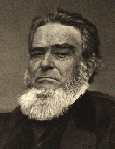 A St. Louis lawyer for forty-three years, Bates was the oldest
member of Lincoln's Cabinet. He also served his home state of
Missouri as state's attorney, as a state representative and in
the Missouri Senate, as a U.S. district attorney, and also he
served one term in the United States Congress. He presided over
the Whig national convention in 1856 and was a leading candidate
for the Republican nomination in 1860.
A St. Louis lawyer for forty-three years, Bates was the oldest
member of Lincoln's Cabinet. He also served his home state of
Missouri as state's attorney, as a state representative and in
the Missouri Senate, as a U.S. district attorney, and also he
served one term in the United States Congress. He presided over
the Whig national convention in 1856 and was a leading candidate
for the Republican nomination in 1860.
Montgomery
Blair
1813-1883
Postmaster General 1861-1864
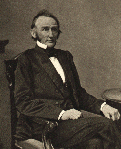 A graduate of West Point, Blair practiced law in St. Louis and
was its mayor in 1842-1843, then a judge until 1849. Moving to
Maryland in 1852, he became a US Solicitor in the Court of Claims.
He is best known for his representation in the Supreme Court of
Dred Scott. As postmaster he introduced money orders, free city
delivery and mail sorting on postal cars.
A graduate of West Point, Blair practiced law in St. Louis and
was its mayor in 1842-1843, then a judge until 1849. Moving to
Maryland in 1852, he became a US Solicitor in the Court of Claims.
He is best known for his representation in the Supreme Court of
Dred Scott. As postmaster he introduced money orders, free city
delivery and mail sorting on postal cars.
Salmon
P. Chase
1801-1873
Secretary of the Treasury 1861-1864
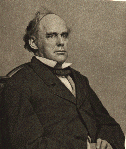 Salmon Portland Chase born in 1808 of Cornish, New Hampshire,
became well known in Cincinnati, Ohio as the " attorney general
of fugitive slaves' for his efforts on that behalf of many slaves
who sought freedom in the free state of Ohio. Elected to the United
States Senate in 1849, he was an outspoken opponent of slavery
extension. Chase served Ohio as its governor for two terms.
December 1864, President Lincoln appointed him Chief Justice of
the U.S. Supreme Court, where he served until his death in New
York in May of 1873.
Salmon Portland Chase born in 1808 of Cornish, New Hampshire,
became well known in Cincinnati, Ohio as the " attorney general
of fugitive slaves' for his efforts on that behalf of many slaves
who sought freedom in the free state of Ohio. Elected to the United
States Senate in 1849, he was an outspoken opponent of slavery
extension. Chase served Ohio as its governor for two terms.
December 1864, President Lincoln appointed him Chief Justice of
the U.S. Supreme Court, where he served until his death in New
York in May of 1873.
William
H. Seward
1801-1872
Secretary of State 1861-1869
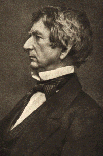 Beginning the practice of law in 1823 in Auburn, New York, Seward
was also a member of the state senate in 1830-1834, the governor
of New York 1838-1842, served in the United States Senate 1849-1861,
as a Whig and then a Republican. He was a leading candidate for
the Republican nomination for president at the Chicago convention
in 1860..
Beginning the practice of law in 1823 in Auburn, New York, Seward
was also a member of the state senate in 1830-1834, the governor
of New York 1838-1842, served in the United States Senate 1849-1861,
as a Whig and then a Republican. He was a leading candidate for
the Republican nomination for president at the Chicago convention
in 1860..
Caleb
B. Smith
1808-1862
Secretary of the Interior 1861-1862
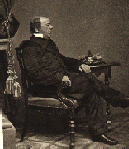 Editor of a small-town newspaper in Indiana, Smith was elected
to the state legislature for several terms before going to the
U.S. Congress in 1843. Influential in Lincoln's nomination in
1860, he became Secretary of the Interior in 1861, resigning in
1862 to become U.S. district judge in Indiana.
Editor of a small-town newspaper in Indiana, Smith was elected
to the state legislature for several terms before going to the
U.S. Congress in 1843. Influential in Lincoln's nomination in
1860, he became Secretary of the Interior in 1861, resigning in
1862 to become U.S. district judge in Indiana.
Edwin
M Stanton
1814-1869
Secretary of War 1862-1862
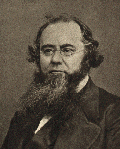 Stanton, a well-known attorney in Ohio, known for using the temporary
insanity plea for the first time in legal history, for his client
Daniel Sickles in a murder case, served a short in the lame duck
administration of President Buchanan's cabinet as attorney general.
He replaced Simon Cameron in 1862 as Lincoln's Secretary of War.
Stanton's integrity, judgment and force won him admiration and
criticism. President Andrew Johnson's efforts to remove Stanton
brought Johnson's impeachment. Appointed by U.S. Grant as an associate
justice to U.S. Supreme Court in 1869, Stanton died four days after
his appointment.
Stanton, a well-known attorney in Ohio, known for using the temporary
insanity plea for the first time in legal history, for his client
Daniel Sickles in a murder case, served a short in the lame duck
administration of President Buchanan's cabinet as attorney general.
He replaced Simon Cameron in 1862 as Lincoln's Secretary of War.
Stanton's integrity, judgment and force won him admiration and
criticism. President Andrew Johnson's efforts to remove Stanton
brought Johnson's impeachment. Appointed by U.S. Grant as an associate
justice to U.S. Supreme Court in 1869, Stanton died four days after
his appointment.
Gideon Welles
1802-1878
Secretary of the Navy 1861-1869
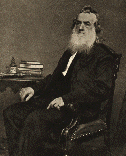 A dominant power in the Democratic party in Connecticut, Gideon Welles was the editor of the Hartford Times and a member of the state legislature)1827-1835). He was state comptroller and postmaster of Hartford, 1835-1842. Welles was a delegate to the Republican national conventional in Chicago in 1860.
A dominant power in the Democratic party in Connecticut, Gideon Welles was the editor of the Hartford Times and a member of the state legislature)1827-1835). He was state comptroller and postmaster of Hartford, 1835-1842. Welles was a delegate to the Republican national conventional in Chicago in 1860.
 A St. Louis lawyer for forty-three years, Bates was the oldest
member of Lincoln's Cabinet. He also served his home state of
Missouri as state's attorney, as a state representative and in
the Missouri Senate, as a U.S. district attorney, and also he
served one term in the United States Congress. He presided over
the Whig national convention in 1856 and was a leading candidate
for the Republican nomination in 1860.
A St. Louis lawyer for forty-three years, Bates was the oldest
member of Lincoln's Cabinet. He also served his home state of
Missouri as state's attorney, as a state representative and in
the Missouri Senate, as a U.S. district attorney, and also he
served one term in the United States Congress. He presided over
the Whig national convention in 1856 and was a leading candidate
for the Republican nomination in 1860.
 A graduate of West Point, Blair practiced law in St. Louis and
was its mayor in 1842-1843, then a judge until 1849. Moving to
Maryland in 1852, he became a US Solicitor in the Court of Claims.
He is best known for his representation in the Supreme Court of
Dred Scott. As postmaster he introduced money orders, free city
delivery and mail sorting on postal cars.
A graduate of West Point, Blair practiced law in St. Louis and
was its mayor in 1842-1843, then a judge until 1849. Moving to
Maryland in 1852, he became a US Solicitor in the Court of Claims.
He is best known for his representation in the Supreme Court of
Dred Scott. As postmaster he introduced money orders, free city
delivery and mail sorting on postal cars. Salmon Portland Chase born in 1808 of Cornish, New Hampshire,
became well known in Cincinnati, Ohio as the " attorney general
of fugitive slaves' for his efforts on that behalf of many slaves
who sought freedom in the free state of Ohio. Elected to the United
States Senate in 1849, he was an outspoken opponent of slavery
extension. Chase served Ohio as its governor for two terms.
December 1864, President Lincoln appointed him Chief Justice of
the U.S. Supreme Court, where he served until his death in New
York in May of 1873.
Salmon Portland Chase born in 1808 of Cornish, New Hampshire,
became well known in Cincinnati, Ohio as the " attorney general
of fugitive slaves' for his efforts on that behalf of many slaves
who sought freedom in the free state of Ohio. Elected to the United
States Senate in 1849, he was an outspoken opponent of slavery
extension. Chase served Ohio as its governor for two terms.
December 1864, President Lincoln appointed him Chief Justice of
the U.S. Supreme Court, where he served until his death in New
York in May of 1873. Beginning the practice of law in 1823 in Auburn, New York, Seward
was also a member of the state senate in 1830-1834, the governor
of New York 1838-1842, served in the United States Senate 1849-1861,
as a Whig and then a Republican. He was a leading candidate for
the Republican nomination for president at the Chicago convention
in 1860..
Beginning the practice of law in 1823 in Auburn, New York, Seward
was also a member of the state senate in 1830-1834, the governor
of New York 1838-1842, served in the United States Senate 1849-1861,
as a Whig and then a Republican. He was a leading candidate for
the Republican nomination for president at the Chicago convention
in 1860.. Editor of a small-town newspaper in Indiana, Smith was elected
to the state legislature for several terms before going to the
U.S. Congress in 1843. Influential in Lincoln's nomination in
1860, he became Secretary of the Interior in 1861, resigning in
1862 to become U.S. district judge in Indiana.
Editor of a small-town newspaper in Indiana, Smith was elected
to the state legislature for several terms before going to the
U.S. Congress in 1843. Influential in Lincoln's nomination in
1860, he became Secretary of the Interior in 1861, resigning in
1862 to become U.S. district judge in Indiana. Stanton, a well-known attorney in Ohio, known for using the temporary
insanity plea for the first time in legal history, for his client
Daniel Sickles in a murder case, served a short in the lame duck
administration of President Buchanan's cabinet as attorney general.
He replaced Simon Cameron in 1862 as Lincoln's Secretary of War.
Stanton's integrity, judgment and force won him admiration and
criticism. President Andrew Johnson's efforts to remove Stanton
brought Johnson's impeachment. Appointed by U.S. Grant as an associate
justice to U.S. Supreme Court in 1869, Stanton died four days after
his appointment.
Stanton, a well-known attorney in Ohio, known for using the temporary
insanity plea for the first time in legal history, for his client
Daniel Sickles in a murder case, served a short in the lame duck
administration of President Buchanan's cabinet as attorney general.
He replaced Simon Cameron in 1862 as Lincoln's Secretary of War.
Stanton's integrity, judgment and force won him admiration and
criticism. President Andrew Johnson's efforts to remove Stanton
brought Johnson's impeachment. Appointed by U.S. Grant as an associate
justice to U.S. Supreme Court in 1869, Stanton died four days after
his appointment. A dominant power in the Democratic party in Connecticut, Gideon Welles was the editor of the Hartford Times and a member of the state legislature)1827-1835). He was state comptroller and postmaster of Hartford, 1835-1842. Welles was a delegate to the Republican national conventional in Chicago in 1860.
A dominant power in the Democratic party in Connecticut, Gideon Welles was the editor of the Hartford Times and a member of the state legislature)1827-1835). He was state comptroller and postmaster of Hartford, 1835-1842. Welles was a delegate to the Republican national conventional in Chicago in 1860.